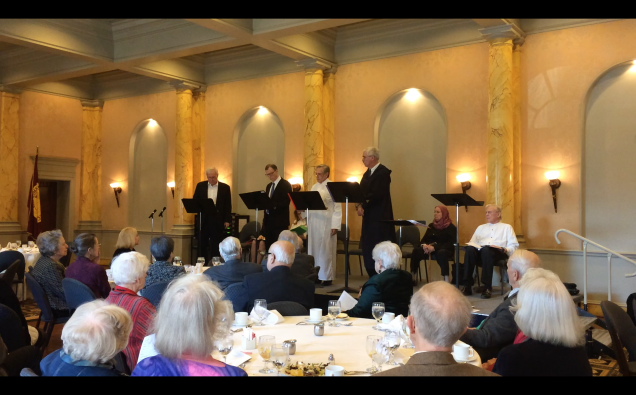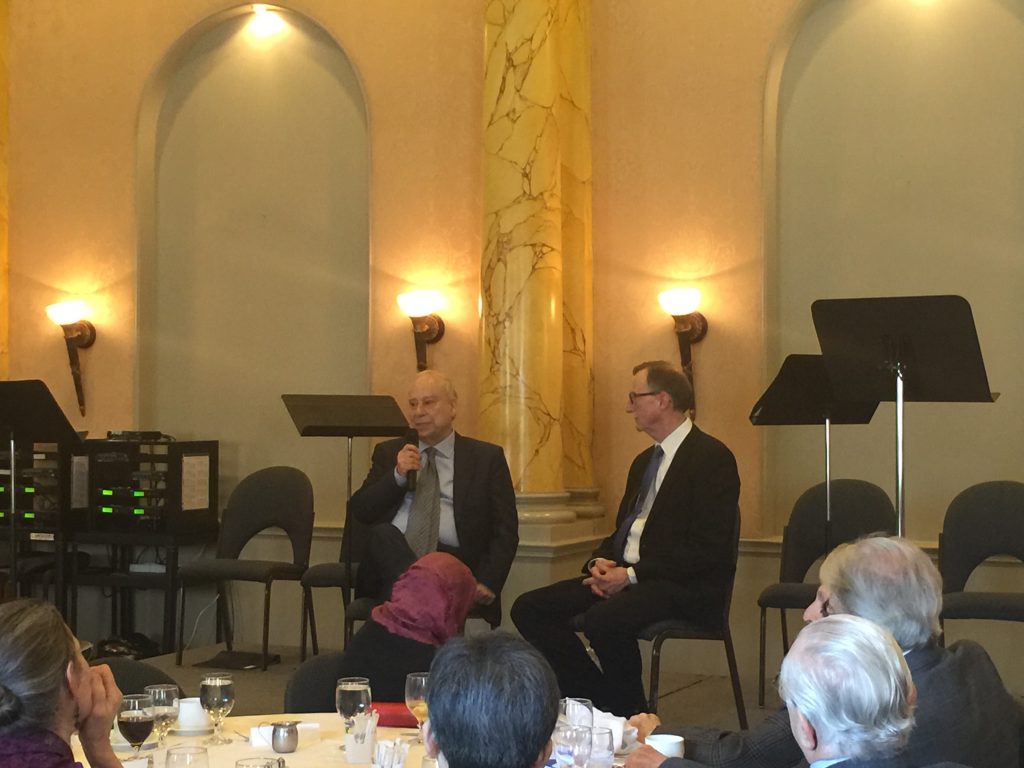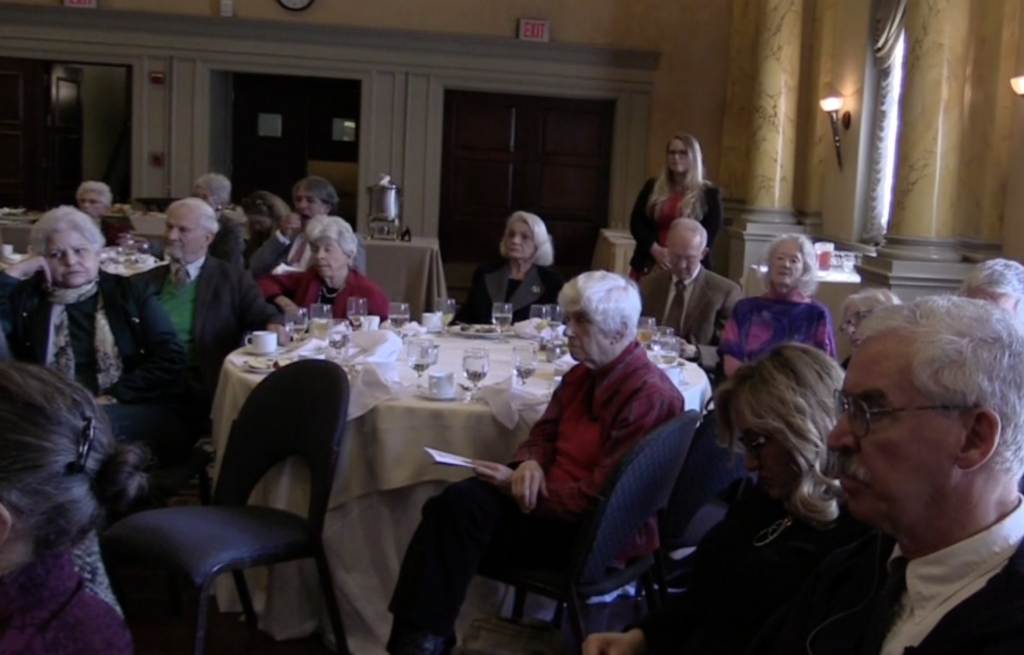
Featured Image: Cosmos Club members and their guests actively watch a stage reading of Ambassador Akbar Ahmed’s play Noor
Fear permeates nearly every discussion about Muslims in America today – whether the conversation is about terrorist organizations, like IS, or refugees seeking a better life. Underpinning this fear that has been particularly persistent in the past 15 years since 9/11, is a lack of knowledge about Islam.
I often forget how little most Americans know about Islam as I have spent the past four years immersing myself in information about the faith, connecting on personal and professional levels with Muslims, and learning Arabic, but, each time I return to my hometown and receive skeptical questions about Islam and Muslims I am reminded of the need to develop understanding. Many Americans have never knowingly interacted with a Muslim, nor have they received an education on Islam or sought one independently. The result is that it becomes easy to dehumanize Muslims and assume that Islam represents everything perceived as reprehensible based on the passing information projected by the media. Each of these encounters reminds me how desperately average Americans need to connect with Muslims, if their perceptions on Islam are to ever change.
The key to unlocking America’s ethos of tolerance, that seems to be lost, lies not in educating all Americans about the 5 pillars of Islam or the nuances of the holy texts, but in opening Americans’ eyes to their shared humanity with Muslims. In an ideal world, this could happen through establishing personal friendships; however, that is an unrealistic goal. Instead, we must find other ways to show Americans who may never meet a Muslim, their commonalities. Art has proven itself a useful tool as Americans connected with the photograph of the young, lifeless Syrian refugee child who washed onto Turkey’s shore and the video and still shot of the stunned, injured boy in Syria. These powerful images helped Americans understand the impossible decision Syrian families were facing: should they stay or attempt to flee? Performing arts may offer the key to expanding Americans’ understanding of Islam and offering a more nuanced look at what it means to be Muslim.

Ambassador Akbar Ahmed answers audience questions after a stage reading of his play Noor at the Cosmos Club in Washington, DC.”
“Noor” is a two-act play, written by Ambassador Akbar Ahmed, my mentor and the Ibn Khaldun Chair of Islamic Studies at American University, which effectively portrays how relatable responses to crisis manifest as representations of Islam. In this play, a young woman named Noor has been abducted by soldiers and her brothers Abdullah, Daoud, and Ali all grapple with the best means to ensure their sister’s safety and respond to the incident. Each brother’s response reflects a prevalent attitude in modern Muslim communities. Abdullah, a mystic, seeks answers with his Sheikh and turns to prayer. Daoud, a literalist, responds with anger, blames Americans, and seeks revenge in violence. Ali, a modernist, hopes to find an answer through support of the government. Through the brothers’ debates about how to rectify Noor’s abduction, the viewer gains insights into human drive behind each brother’s perspectives.
The play has received wide praise for its contributions towards a better understanding of the Muslim World since its premier at Theater J in Washington, DC in 2007. Daniel Futterman, actor and Oscar-nominated screenwriter, wrote of Noor, “Listen in rapture to the voices of modern Islam. I am in awe of this tremendous, important work.” Ted Merwin of the Washington Post wrote a raving review titled, “Akbar Ahmed’s ‘Noor,’ a Paean to Religious Tolerance.”
On March 18, 2017, I was invited to join Ambassador Ahmed for a stage reading of the play at the Cosmos Club in Washington, DC. The Cosmos Club is a private social club in Washington, DC whose distinguished members are invited for their scholarship, creative genius, or intellectual distinction and has counted among its members three former U.S. Presidents (Woodrow Wilson, William Howard Taft, and Herbert Hoover), two former U.S. Vice Presidents, a dozen Supreme Court Justices, 36 Nobel Prize winners, 55 Presidential Medal of Freedom recipients, and other notable individuals, such as Alexander Graham Bell and Henry Kissinger. Joining us for the reading were Cosmos Club members and their guests, including the playwright Ahmed’s guest, William Kennedy Smith, the nephew of former President John F. Kennedy, and his wife.
This was my second time seeing a reading of the play and I was struck by how much more meaning took from the play during my second viewing. Instead of just following the story, I was able to notice the humanity that came through in the voice of each brother and shed light on various aspect of the Muslim world. My conversations with the cast and the audience’s commentary following the play reinforced my realization that the play served as a powerful tool for understanding Muslims in the modern world.

“The audience of the stage reading of Noor at the Cosmos Club and author Elisa Frost participate in a question and answer session with the playwright Akbar Ahmed.”
While the playwright intended the play to provide insights into the Muslim world, with very few minor adaptations, the story could easily be set anywhere in the world where people face injustice and uncertainty. The brothers’ responses to injustice could be seen anywhere, as there are people everywhere who respond to emergencies with spirituality, anger, and hope that the system will provide an answer. This is what makes the play so powerful – it connects universal reactions to crisis with how they connect to the spectrum of the Islamic faith, allowing outsiders to better empathize with Muslims of various inclinations.
Richard Waugaman, who played Abdullah, told me that he hoped the audience would also take away universal messages from the play observing, “This is not just an opportunity for us in the West to learn about Islam, it’s an opportunity to learn about ourselves that we suffer from that same flaw of wanting to project blame onto someone else.” Kate Scharff, who played Noor, reflected a similar sentiment when she told me, “I actually have anxiety and anger around some of those issues as they are playing out in our country now, Muslims being one of many targets, but really we are the targets.”
Ambassador Ahmed noted during the question and answer session that followed the performance that the job of a playwright is to merely hold a mirror to society. He certainly succeeded: by holding a mirror to the Muslim world, Ahmed not only offered insights into the diversity of the Muslim world, but managed to portray this diversity in a way that also reflected diversity in the West. “Noor” offers a foundation to establish the empathy for others that is crucial to navigating today’s world challenges and fostering peaceful relationships. High schools and universities around the country should consider staging a production to provide their students and community members valuable insights into our shared humanity.
The author contributed this article to Views and News and The Huffington Post on March 21, 2017














You need to be a part of a contest for one of the highest quality blogs on the web. I most certainly will recommend this website!
Thank you for the good writeup. It in fact was a amusement account it. Look advanced to more added agreeable from you! By the way, how could we communicate?
Good day! I just wish to give you a huge thumbs up for the excellent info you have right here on this post. I am returning to your web site for more soon.
Greate article. Keep writing such kind of information on your blog. Im really impressed by it.
You ought to be a part of a contest for one of the best sites online. I am going to recommend this site!